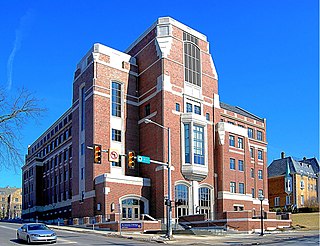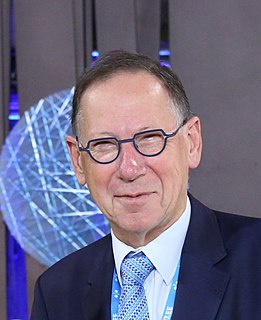
The United Nations University (UNU) is the academic and research arm of the United Nations. Headquartered in Shibuya, Tokyo, Japan, with diplomatic status as a U.N. institution, its mission is to help resolve global issues related to human development and welfare through collaborative research and education.
Maastricht University is a public research university in Maastricht, Netherlands. Founded in 1976, it is the second youngest of the thirteen Dutch universities.
The Munk School of Global Affairs and Public Policy at the University of Toronto is an interdisciplinary academic centre with various research and educational programs committed to the field of globalization. It offers master's degrees in Global Affairs, Public Policy, European, Russian, and Asia-Pacific studies. The Munk School is a member of the Association of Professional Schools of International Affairs, a group of schools that educate students in international affairs. Admission to the Munk School is highly competitive.

The Hubert H. Humphrey School of Public Affairs at the University of Minnesota is one of the United States' top-ranked professional public policy and planning schools. The school is noted for equipping students to play key roles in public life at the local, state, national, and global level and offers six distinctive master's degrees, a doctoral degree, and six certificate programs.

The School of International and Public Affairs at Columbia University (SIPA) is the international affairs and public policy school of Columbia University, a private Ivy League university located in Morningside Heights, Manhattan, New York City.
The University of Chicago Harris School of Public Policy, also referred to as "Harris Public Policy," is the public policy school of the University of Chicago in Chicago, Illinois, United States. It is located on the University's main campus in Hyde Park. The school's namesake is businessman Irving B. Harris, who made a donation that established the Harris School in 1986. In addition to policy studies and policy analysis, the school requires its students to pursue training in economics and statistics through preliminary examinations and course requirements. Harris Public Policy offers joint degrees with the Booth School of Business, Law School, School of Social Service Administration, and the Graduate Division of the Social Sciences.

The Gerald R. Ford School of Public Policy, often referred to as the Ford School, is a leading public policy school at the University of Michigan. Founded in 1914 to offer training in municipal administration, in 1999 the school was named after former President Gerald Ford, who graduated from the University of Michigan in 1935. In the latest U.S. News & World Report rankings, the Ford School was ranked #1 in social policy, #3 in health policy and management, #5 in public policy analysis, #7 in environmental policy and management, and #7 in public affairs overall.

Public Policy schools are typically university programs which teach students policy analysis, policy studies, public policy, political economy, urban planning, public administration, public affairs, and public management. Public policy schools typically train students in two streams. The more practical stream treats the master's degree as a terminal degree, which trains students to work as policy analysts or practitioners in governments, think tanks and consulting firms. A more theoretical stream aims to train students who are aiming to go on to complete doctoral studies, with the goal of becoming professors of public policy or researchers.

The United Nations University - Maastricht Economic and Social Research Institute on Innovation and Technology(UNU-MERIT) is a research and training institute of the United Nations University which cooperates closely with Maastricht University, based in Maastricht in the southeastern part of the Netherlands.
The Maryland School of Public Policy is one of 14 schools at the University of Maryland, College Park. The school is located inside the Capital Beltway and ranks 16th nationally for schools of public policy according to U.S. News & World Report (2012).

The Hertie School is a private independent graduate school for public policy, international affairs and data science located in Berlin's Friedrichstraße. It is a public policy school and is accredited to confer master's and doctoral degrees. Half of the students in the Hertie School come from abroad, and the working language is English.
The Lee Kuan Yew School of Public Policy is an autonomous postgraduate school of the National University of Singapore (NUS), named after the late former Prime Minister of Singapore, Lee Kuan Yew.

The Graduate Institute of International and Development Studies, or the Graduate Institute, abbreviated IHEID, is a government-accredited postgraduate institution of higher education located in Geneva, Switzerland.

Luc Soete is a Belgian economist, former Rector Magnificus and professor of International Economic Relations at the School of Business and Economics, Maastricht University, and former director of UNU-MERIT, a joint research institute of the United Nations University (UNU) and Maastricht University. Luc Soete is a member of the Dutch scientific advisory body (AWTI) and the Royal Netherlands Academy of Arts and Sciences (KNAW) since 2010.

The National Graduate Institute for Policy Studies, or GRIPS, is an elite and highly selective research graduate school located in Minato, Tokyo. Funded by the Japanese Government, it has the status of national university. It is also one of Asia's leading think tanks of policy scholars and social scientists focused on policy studies. It offers programs in security and international affairs, diplomacy, international development studies, economics, political science, disaster studies, and science and technology policies, among others.

The United Nations University Institute on Comparative Regional Integration Studies (UNU-CRIS) is a Research and Training Institute of the United Nations University (UNU). Based in Bruges, (Belgium) since 2001, UNU-CRIS specializes in the comparative study of regional integration and the provision of global and regional public goods, including environmental stability, poverty reduction, peace and justice.

The KDI School of Public Policy and Management is a government-run graduate school located in Sejong City, South Korea and is affiliated to the Korea Development Institute (KDI) and a member of the National Research Council for Economics, Humanities, and Social Sciences. The school was first established in 1997 in Dongdaemun District, Seoul, before moving to Sejong City in 2015 under the South Korean government's actions to establish the city as the de facto administrative capital of the country. The school specializes in fostering international experts in the field of development economics and public policy.

The Balsillie School of International Affairs (BSIA) is a centre for advanced research and teaching on global governance and international public policy, located in Waterloo, Ontario. As one of the largest social sciences initiatives in Canada, the school is a collaborative partnership between the University of Waterloo, Wilfrid Laurier University, and the Centre for International Governance Innovation. The BSIA is an affiliate member of the Association of Professional Schools of International Affairs, a group of schools that educate leaders in international affairs. The BSIA is housed in the north and west wings of the CIGI Campus. Admission to BSIA is highly selective.

The Willy Brandt School of Public Policy is a public institute for research and education in the field of public policy at the University of Erfurt. It was established in 2002, offering the first German study program leading to a Master of Public Policy (MPP) degree. The program has been accredited and reaccredited by ACQUIN. The working language is English. Until November 2009, the school was named Erfurt School of Public Policy (ESPP).

Melissa Siegel is an American academic specialising in migration. She is professor of migration studies at the Maastricht Graduate School of Governance and UNU-MERIT where she has also been head of the migration and development research section since 2010.













